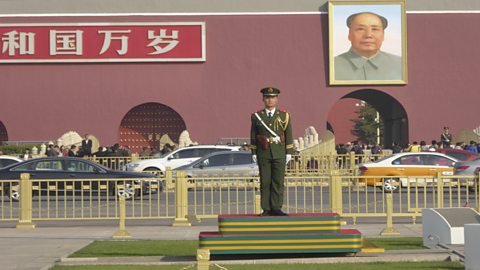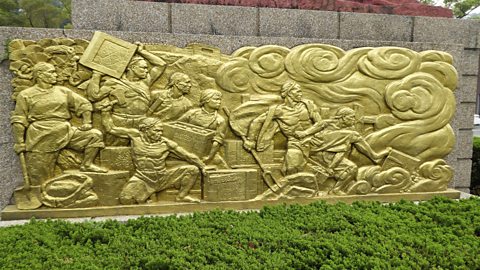PRESENTER:'The Chinese revolution of 1949 'was preceded by several other revolutions.
PRESENTER:'The greatest of them, the Taiping.
PRESENTER:'In the 1840s, China was still the greatest state on Earth, 'but the first opium war had left the government weakened.
PRESENTER:'They'd ceded territory and trading rights to the British.
PRESENTER:'Around this time, a chance meeting took place 'between a Chinese student called Hong, 'and an American missionary handing out Christian pamphlets.
PRESENTER:'And he stops Hong and he says to him,' "Follow the Christian God, and you will reach the highest glory."
PRESENTER:And he gives him one of the pamphlets, and in it Hong sees the story of Noah and the flood, and he reads his own name, Hong, literally 'the flood'.
PRESENTER:God's instrument to punish humanity for failing to follow the path of righteousness.
PRESENTER:'The Bible message had a deep effect on Hong, 'who, like many Chinese, 'was troubled by the influence of the West, 'the weakness and corruption of the Qing government, 'and the grinding poverty of ordinary people.
PRESENTER:'Looking for a job, Hong headed to the hills. 'He became a village teacher out in the wild countryside of the south.
PRESENTER:'And here, the Bible texts began to work on his mind.
PRESENTER:'The rural poor here were ripe for revolution. 'Since the 1600s, China's population had nearly trebled. 'The stagnant economy brought mass poverty and unemployment.
PRESENTER:'The rulers were oppressive. 'And Hong's preaching on social justice found a willing audience 'just as the communist message would in the 20th Century.
PRESENTER:'Hong started to organise village meetings.
PRESENTER:'He identified the Christian God with the high god of Ancient China, 'and he now told the people that he was God's Chinese son.
PRESENTER:'He was going to create heaven's kingdom on Earth 'by overthrowing the Qing Empire, 'and making a golden age, where society lived in harmony, 'and when justice was for the poor as well as the rich.
PRESENTER:We get kind of mesmerised by the religious background to the Taiping, and it is incredible, isn't it, God's Chinese son?
PRESENTER:But you mustn't forget it's a great peasant uprising, this is the poor, rural, agrarian workforce, who are rising up against their traditional enemies, the landlords and the rich.
PRESENTER:'Through the 1840s, the movement grew, 'and they gathered thousands of followers.
PRESENTER:'The Qing government ordered troops to put them down, 'but in such wild places, it was too late.
PRESENTER:'They'd created revolutionary cells in hundreds of villages. 'And this is one of them, Rushing Water village.
PRESENTER:'Hong's right-hand man, Feng, 'was based here till the eve of the uprising.
PRESENTER:'It's hard to imagine, isn't it, 'such earth-shaking historical events 'beginning in such out-of-the-way places?
PRESENTER:'But by 1849, these little villages under Thistle Mountain 'were just humming with omens and visions and prophecies.'
PRESENTER:Jesus was making regular descents down to Earth to bring Hong messages from heaven in his dreams.
PRESENTER:Angels in golden robes were giving succour to the Taiping teachers, and God Himself, in his great black dragon robe, with his golden beard, was showing Hong, in his trances, the demon armies which he must overcome.
PRESENTER:Then in Spring, 1850, Hong put on the yellow robe of the empire and gave the command for all the Taiping worshippers of God to gather together and descend into the plain.
PRESENTER:The revolution was about to begin.
PRESENTER:'Hong assembled an army of 100,000 men. 'They defeated the Qing forces in the south. 'And, in March, 1853, Nanjing fell, 'and Hong was enthroned as the ruler of God's heavenly kingdom.
PRESENTER:'So the Taiping had gained power. 'But what would they do with it?
PRESENTER:'It's a question faced by all China's revolutionaries, 'and what they did, in some ways, 'uncannily anticipated the communists in the 20th Century.
PRESENTER:There's the throne of the heavenly king.
PRESENTER:Once God's kingdom here on Earth had been established in Nanjing, a blizzard of ideological pronouncements came pouring from this throne.
PRESENTER:They banned opium, tobacco, alcohol, foot-binding, prostitution, gambling, they separated the sexes, there was the death penalty for sex between men.
PRESENTER:Most important of all, China was to be classless. Private ownership of property, private ownership of land, were abolished. All land would be owned by the state, and distributed by the state.
PRESENTER:'The Taiping state spread its power 'across the rich heartland of the south, 'and here in Nanjing, 'the people got used to a kind of fundamentalist rule, 'with inquisitorial new laws, 'and savage punishments for simple pleasures.
PRESENTER:'In the back streets, 'you can still find traces of the Taiping's 16-year rule.
PRESENTER:'This was the house of one of their leaders, 'or princes, as they began to call themselves.
PRESENTER:'This house belonged to the Li family 'before the Taiping rebels took over the city 'and they fled into the countryside, 'and a leading Taiping prince took this over as his own residence.'
PRESENTER:And he has the house painted with Taiping-themed murals.
PRESENTER:No representation of the human form.
PRESENTER:They were iconoclasts, they'd destroyed images and human representations, Daoist temples, Buddhist and Confucian shrines, wherever they'd gone.
PRESENTER:So the images from nature are birds, horses, landscapes. Over there, the five-storey wooden watchtower, the type that the Taiping armies constructed.
PRESENTER:In one of the inner halls, the Taiping prince had had the Chinese symbol for long life painted on the wall.
PRESENTER:But long life, the Taiping leaders would not achieve.
PRESENTER:'So China now had two capitals, 'the Qing emperor still ruled in the north, in Beijing, 'Taiping in the south.
PRESENTER:'But for the British and the other foreigners, 'their financial stake in China, built up since the opium war, 'was too big to jeopardise.
PRESENTER:'So they lent the Chinese government advisors and the latest weapons 'to help crush the rebels.
PRESENTER:'Eventually, the Qing emperor massed a million men against them. 'And in 1864, after a failed attempt to take Beijing, 'the Taiping were forced back behind the walls of Nanjing.
PRESENTER:'Soon, the rebels inside the city were decimated 'by disease and starvation. 'And then Hong himself fell ill and died.'
PRESENTER:'By the end, 'over 20 million people had died of famine, disease and fighting. 'It was by far the worst war of the 19th Century.
PRESENTER:'The Qing government had weathered the storm for now, 'but the Taiping had unleashed forces 'that would eventually bring down the empire in 1911.
PRESENTER:'And pave the way for the communist revolution of 1949.'
Historian Michael Wood calls it the 'worst war of the 19th Century'. He explores the background to the revolt - the defeat in the Opium War, and rural poverty.
The Taiping Rebellion was mostly a revolt by poor rural peasants against their landlords and the rich; inspired by the religious pamphlets of an American missionary.
Hong, the leader, spent years in the rural South of China preparing the peasants for rebellion.
Initially very successful, Hong, with an army of 100,000 men, was installed as Emperor in Nanjing.
China had two governments - one traditional [the Qing, in Beijing] the other revolutionary, in Nanjing.
The Taiping rebels created a brave new world - a classless society where private property was abolished.
Finally, in 1864, aided by Britain and the other Western Powers and modern weapons, the Qing were able to re-conquer Nanjing and finally defeat the Taiping Rebellion and reunite China.
This short film is from the BBC series, The Story of China. A series exploring the stories, people and landscapes that have helped create China's distinctive character and genius over four thousand years.
Teacher Notes
You could start by discussing whether the Taiping rebellion was merely a revolt by the rural poor against the rich.
You could then discuss the reasons for the defeat of the rebels in 1864.
Finally, you could discuss the long-term impact of the Taiping Rebellion on China.
Curriculum Notes
This short film is relevant for teaching history at Key Stage 3 and 4 in England, Wales and Northern Ireland and at Third and Fourth Level in Scotland.
More from The Story of China
The Rise of Mao ZeDong. video
Historian Michael Wood explores the origins and rise of the Chinese Communist Party, and the significance of Mao Zedong in the process.

The First Opium War, 1838-1842. video
Historian Michael Wood explores the causes, events and consequences of the First Opium War.
